Harmonie Klein is a PhD candidate at the Max Planck Institute for Evolutionary Anthropology. She received a Leakey Foundation grant in 2019 for her project entitled: “Hunting strategy and food sharing in wild central African chimpanzees.”
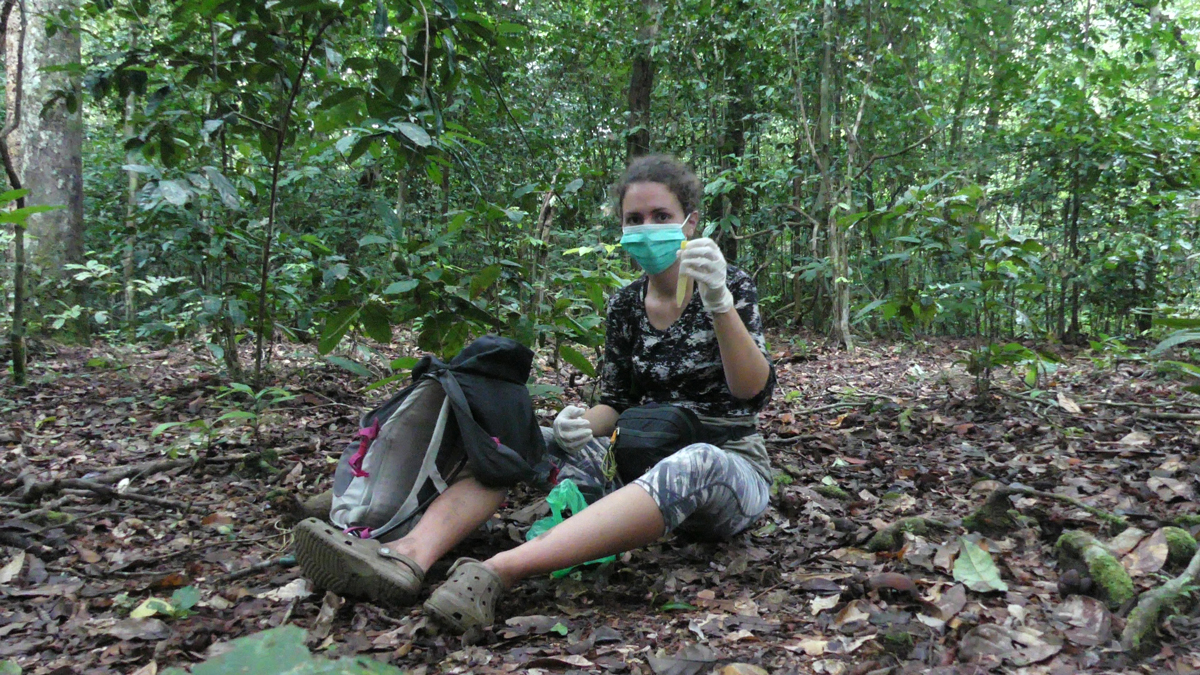
Q: Have you always been interested in science?
Harmonie Klein: As far as I remember, I always wanted to work with animals, in nature. I have a strong memory from my childhood of finding a small dead baby bird on the ground. I remember observing it from every angle, opening its beak or its wings, taking notes in a small notebook and drawing it. But strangely, I always said I hated science. My goal was really to study animal behavior to better understand this fascinating wild world, but it was not science for me. Naturally, I began an ethology course at university and suddenly one day, I realized with surprise that I was a scientist.
Q: How did you become interested in your current field?
Harmonie Klein: During graduate school, I first studied human impact on a ring-tailed lemur group in a zoo. Then I worked on vocal plasticity and development in the grey mouse lemur to better understand the origin of babbling in humans. These first experiences were my first contact with primates and I became interested in better understanding humans through studying other primates. Thus, I decided to focus on apes, our closest relative and went to the Loango Chimpanzee Project (LCP), Gabon, to habituate wild chimpanzees. There, I made my first observation of chimpanzees hunting mammals. I was fascinated by this behavior and its similarities with human hunter-gatherer societies.
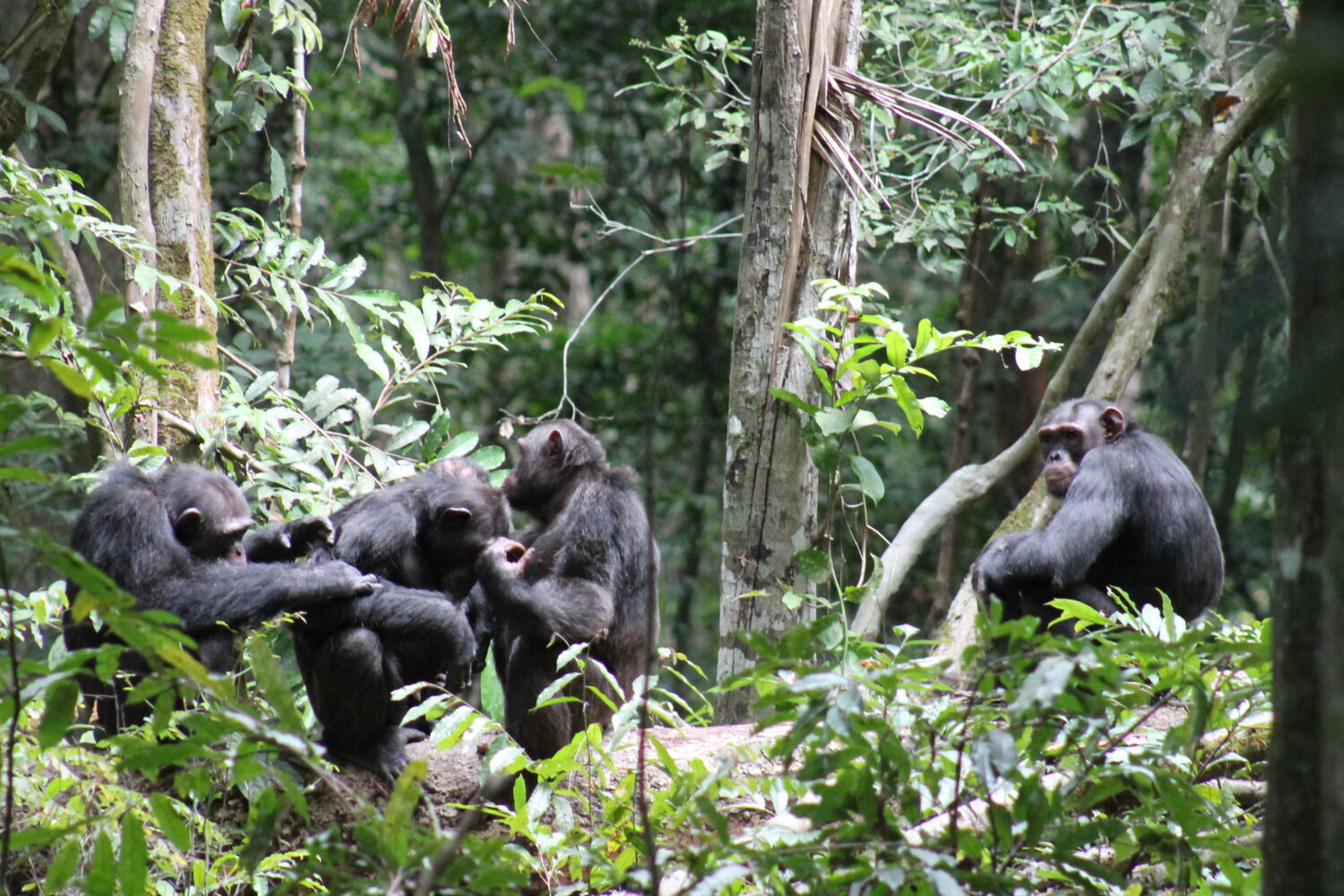
Q: Tell us about your Leakey Foundation-funded project.
Harmonie Klein: The extraordinary degree of cooperation exhibited by humans seems unrivaled in the animal kingdom with group hunting and meat sharing having been suggested as milestones in the evolutionary trajectory of human sociality and life history traits. In humans, meat is an important food resource and meat sharing allows high energetic and social benefits. Besides, successful hunting results in higher reproductive success for good hunters. Therefore, hunting is considered a cooperative act in humans and sharing is motivated by a reward for the invested labor.
Chimpanzees (Pan troglodytes), one of humankind’s closest living relatives, are known to frequently hunt and consume the meat of a variety of vertebrates (ranging from birds to reptiles and to mammals), and share a wide variety of foods such as meat, fruit, and honey. Cooperation in hunting and meat sharing has been described in some chimpanzee populations through collaborative hunting, defined roles, and a reward of more meat for hunters than for non-hunters. However, such observations have not been made at other sites and, even today, cooperation is still considered by some scholars as a uniquely human trait. In addition, food sharing has been claimed as specific to humans while in chimpanzees, food sharing has been seen as only marginally important.
My study will shed new light on this debate and allow us to better understand the evolution of cooperation in humans by focusing especially on hunting and food sharing behaviors of the newly habituated chimpanzees of the Rekambo community in Loango National Park, Gabon. I will especially try to determine the underlying degree of cooperation during hunts, the nature of meat sharing patterns, and the impact of food resources on food sharing patterns in Central African chimpanzees.
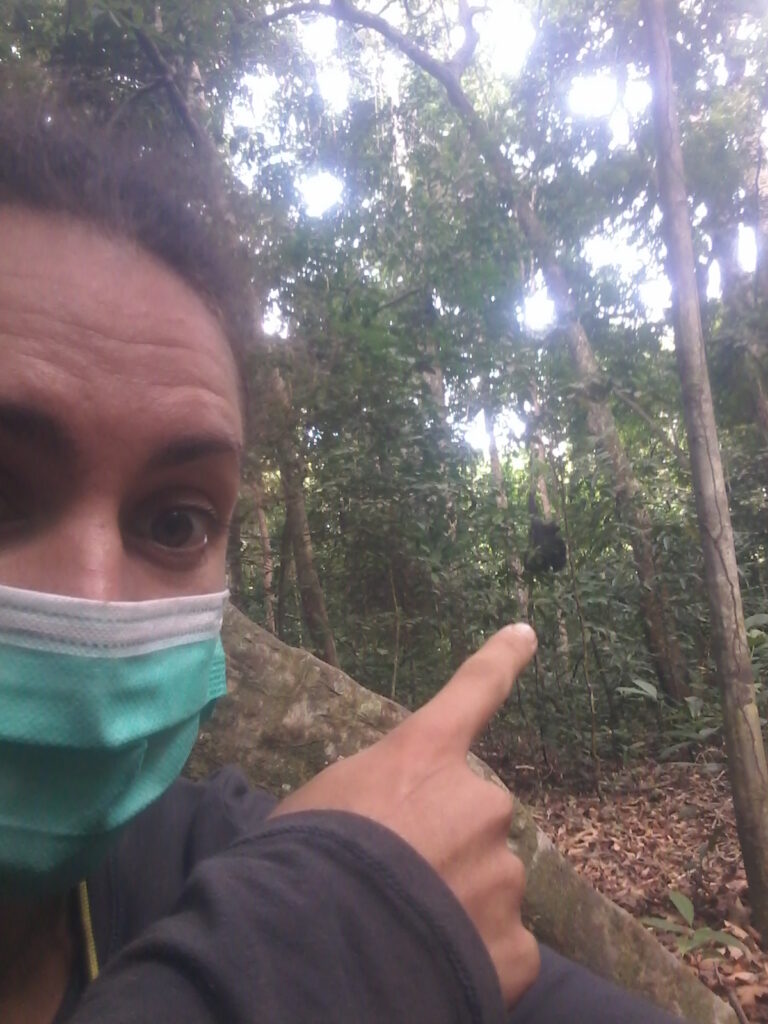
Q: How did you feel when you received your grant?
Harmonie Klein: I have been working with the Loango Chimpanzee Project (LCP) for three years with the goal of realizing this PhD project, but due to the uncertain future of the MPI primatology department at this time, there was no possibility of funding. I did not give up and I worked on the LCP hunting data, I wrote, with colleagues and supervisors, two papers on tortoise predation and hunting behaviors in central African chimpanzees. Having acquired substantial knowledge on this topic, my supervisors finally decided we should try to initiate this project and I applied for a Leakey Foundation grant.
So, how can I describe my feeling when I got my grant? It represents the achievement of all my previous efforts, the achievement of my professional but also personal career aspirations, and the rewarding of a mature project that I thought about and worked on for a long time. This grant gives me the opportunity to collect all the data I need to complete my study, which is very exciting to me. It finally gives me the opportunity to finish my PhD, to become a doctor in primatology and to evolve in my career. And of course, it will also allow me to bring new evidence of chimpanzee behavioral diversity and to shed new light on an important debate around the existence of cooperation in apes and a better understanding of human evolution.
Q: What excites you about your work?
Harmonie Klein: The Rekambo community offers unique research possibilities since the chimpanzees frequently hunt a wide variety of animal taxa. In addition, they share meat and other resources across a wide variety of contexts (mammals, tortoises, honey, fruits) and they provide food before requests without any previous begging, a rare observation in chimpanzees (1.2% of the sharing). Moreover, the unique open primary forest (visibility up to 50 meters), enables the simultaneous observation of several participants in a hunt. Finally, a very exciting aspect of this project is the fact that Loango chimpanzees are one of the lesser-known sub-species of the Pan genus (Pan troglodytes troglodytes). Chimpanzees present a high variation of behavior across all of Africa between groups and sub-species and the Rekambo community already shows different behaviors. Thus, this project will also enable direct quantitative comparisons with other chimpanzee populations and allow us to investigate whether differences in hunting and sharing behaviors across populations are related to demographic, ecological or sub-species differences.
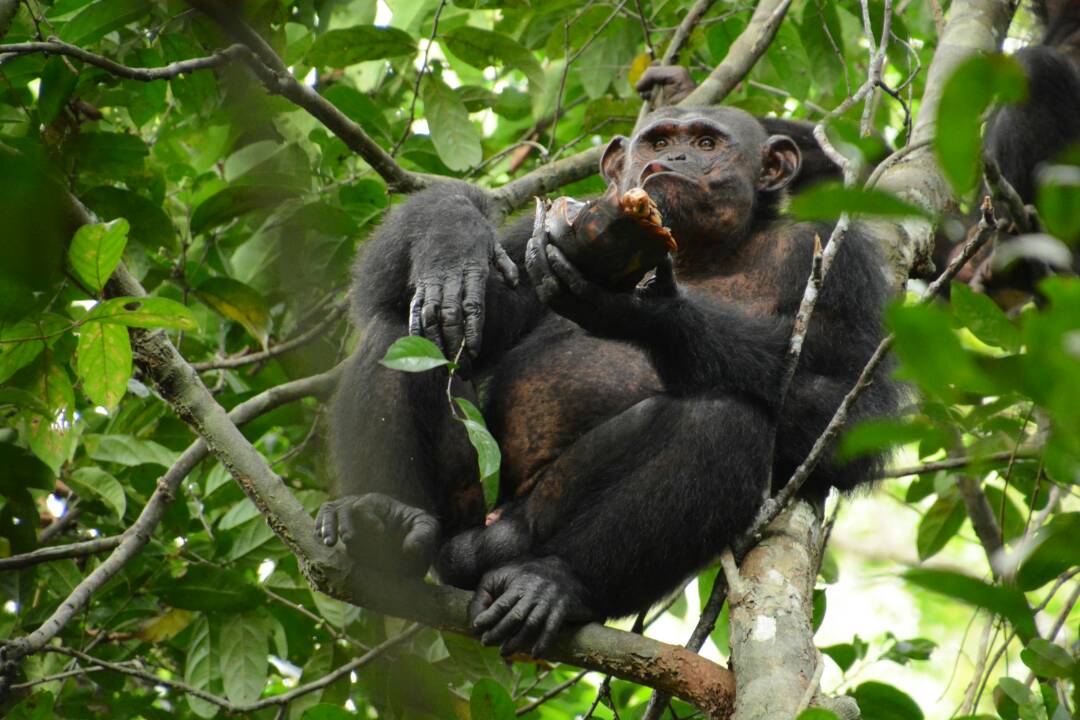
Q: Can you tell us about something interesting you’ve discovered?
Harmonie Klein: A crazy discovery, is the one we made in 2016: Rekambo chimpanzees use a percussive technique to open the shells of the tortoises (Kinixys erosa) they hunt. Tortoise predation happened often, mostly by adult males and seems to require physical abilities to break open the carapace. A research assistant and I also observed a chimpanzee storing a half-eaten tortoise in a tree and coming back the next day to finish it. This could be evidence of future planning in chimpanzees, though further observations are needed to assess it. Reptile consumption was never reported before in wild chimpanzees after more than 60 years of research. This is why studying wild animals is so fascinating! You can always discover new things even after years of research.
Q: What is most challenging about your work?
The physical demands of this work can be a challenge. Living in an isolated setting is also difficult sometimes.
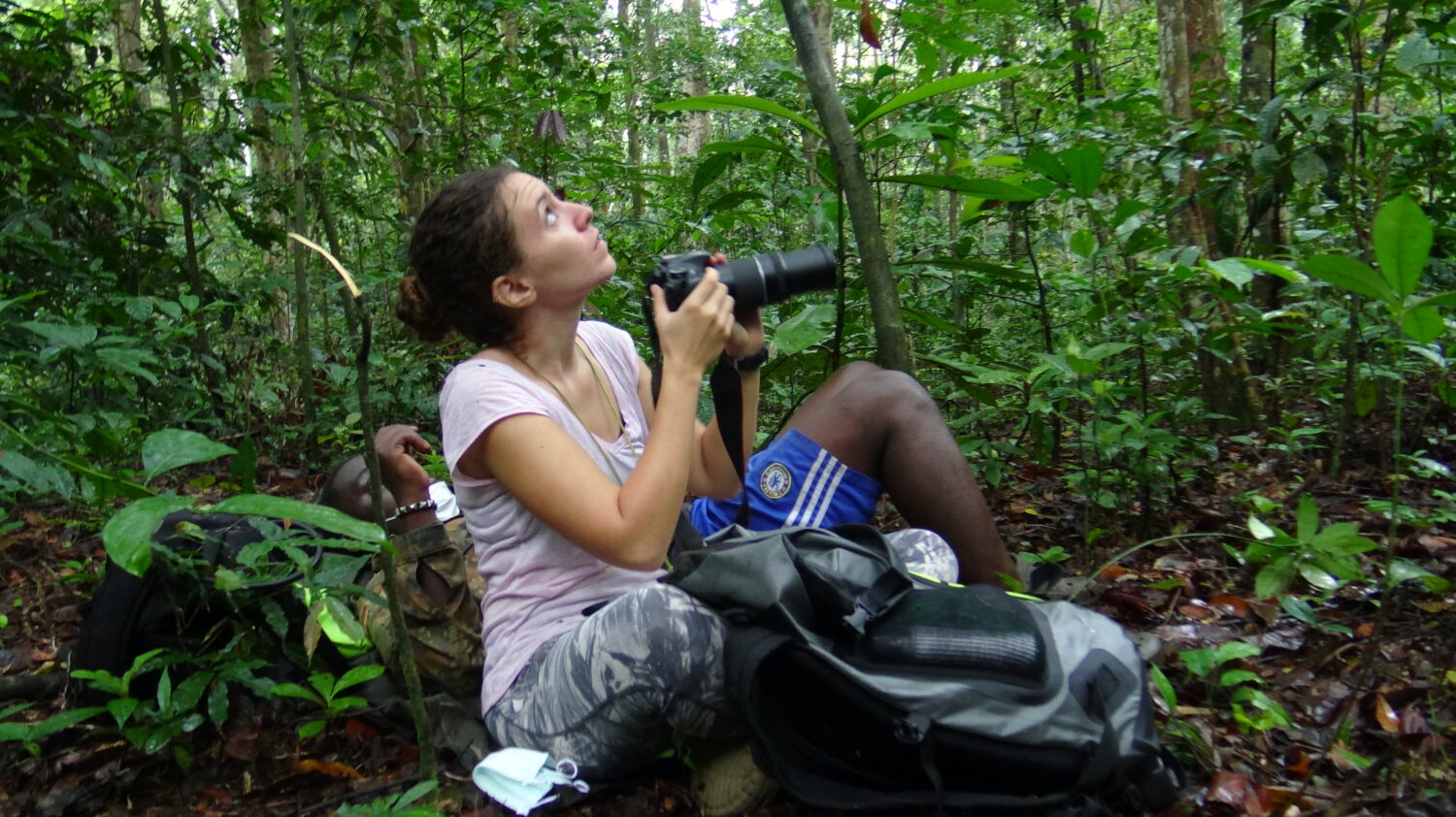
Q: What are you working on right now?
Harmonie Klein: Right now I am working on my data collection protocol to prepare for my departure to the field. The next step is to spend a year in the field, in the LCP, following the Rekambo chimpanzees every day. I am also still working on a paper describing the general pattern of hunting in central African chimpanzees.
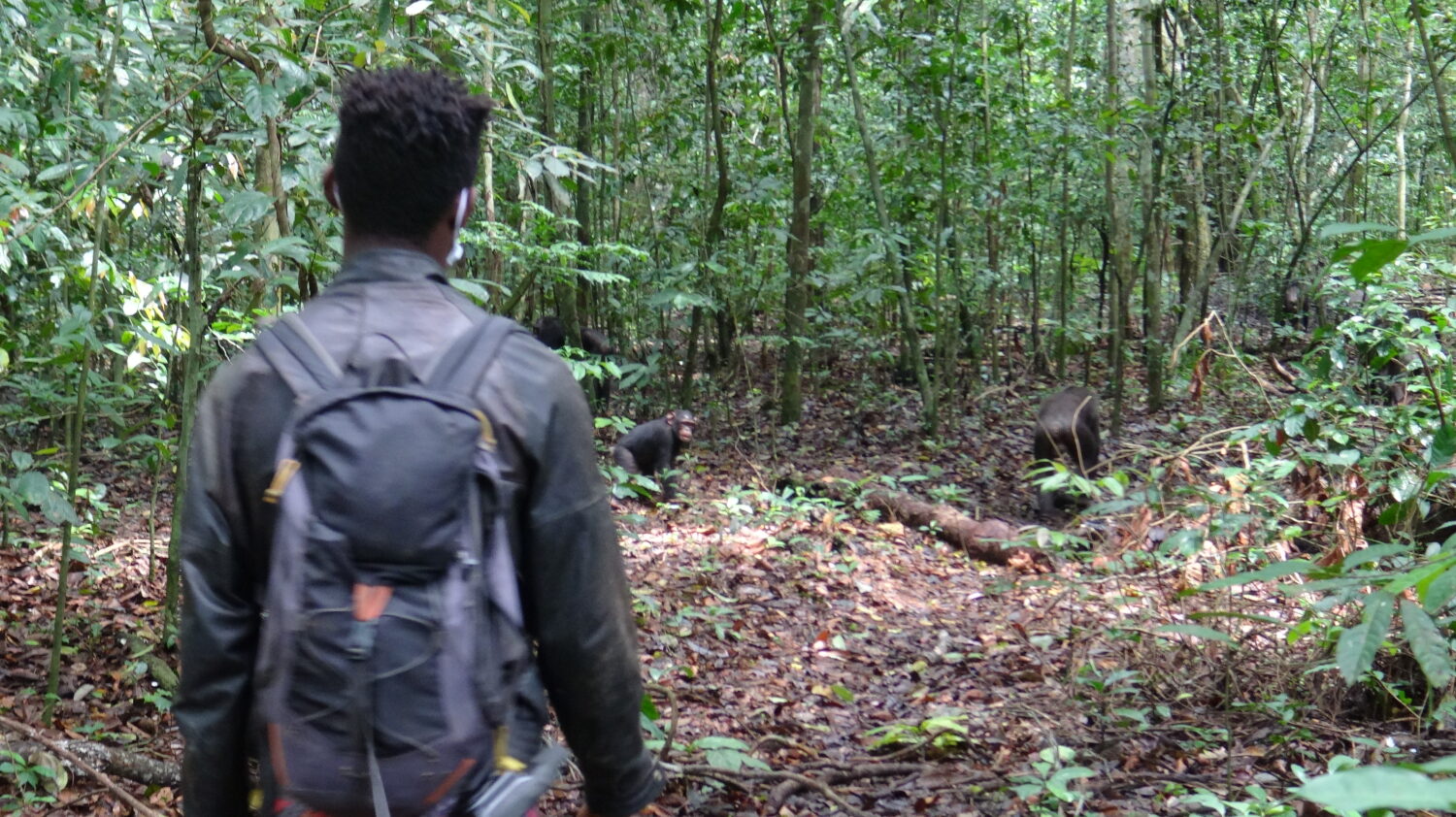
Q: Why do you think research like yours is important?
Harmonie Klein: First, studying wild animals allows us to better understand their behavior, ecology, habits, and the world we live in. Then it gives us tools to improve wild animal conservation, which is essential and a real concern.
Secondly, studying new populations and new sub-species, in chimpanzees but also other taxa, will lead to a better understanding of the behavioral variety of a species across the world.
Finally, apes are our closest living relatives, offering valuable perspectives into the causes and evolution of individual, social, and reproductive human actions. Acquiring knowledge about human evolution is essential for understanding our current behaviors and anatomy.
Studying the hunting and food sharing patterns of chimpanzees at Loango, and comparing these patterns with other well-studied populations will permit a better understanding of the contexts in which cooperative hunting has evolved in humans. Therefore, I hope my research will help The Leakey Foundation in its mission to increase scientific knowledge and public understanding of human evolution.
Comments 1


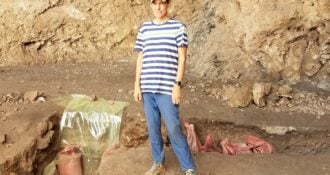
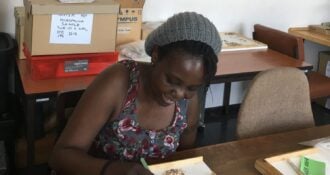
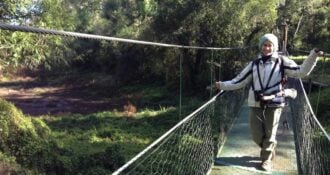
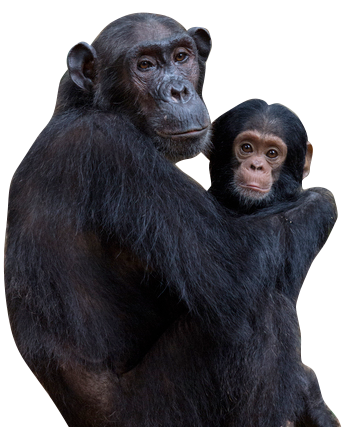
Harmonie indeed your a hard working and motivated person and we remember you in bugoma primate conservation project as our field cordinator, may God grant you whatever you want in your life.